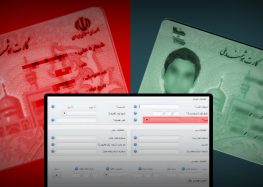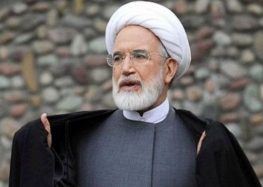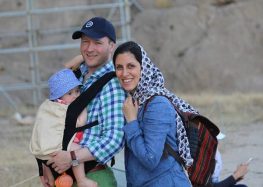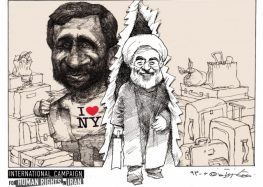Ministry of the Interior
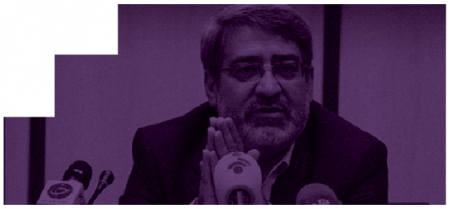 Iran’s police force
Iran’s police force
Right to assembly
Non-governmental organizations (NGOs)
Killing of couriers by border agents
Recommendations
Iran’s police force
The Interior Minister is entrusted with all issues pertaining to Iran’s police force. For this reason, the Interior Minister has a central role in defining the policies and practices of the police force.[1]
The Iranian and international human rights community has repeatedly criticized the Iranian police force for its violent crackdown on peaceful street protests, its severe mistreatment and abuse of the detainees held in its custody, especially after the 2009 elections, and its routine practice of attacking citizens in their private homes in order to confiscate satellite TV equipment. In addition, the police operate their own detention centers, which are not under the supervision of Iran’s Prisons Organization and therefore are not bound by established rules of conduct under which they may be held accountable.
The police routinely detain citizens illegally or inside these unsupervised detention centers, often engaging in physical and psychological abuse and, in some cases, causing the death of detainees.[2] In late 2012, for example, the cyber unit of the police detained blogger Sattar Beheshti and returned his dead body to his family in less than a week. There is strong evidence that police agents tortured and killed Beheshti while interrogating him in a police detention center in Robat Karim.[3]
The right to free peaceful assembly is guaranteed in Iran’s constitution, as well as in Article 21 of the ICCPR, to which Iran is a party. According to Article 27 of Iran’s constitution, “Unarmed assemblies and marches may be freely organized, provided that no violation of the foundations of Islam is involved.”
The Ministry of the Interior is tasked with issuing permissions for peaceful gatherings. However, the Ministry has routinely denied permits for peaceful assemblies to civil society organizations, labor organizations, and political groups over the last several years. In some cases, the Ministry has granted permits for such gatherings but has been unwilling to guarantee the security of the gatherings, which have been attacked by plainclothes individuals believed to be part of the intelligence and security apparatus.
Non-governmental organizations (NGOs)
The regulations for the establishment and operation of non-governmental organizations (NGOs) were developed in 2005 during the Seyed Mohammad Khatami presidency. According to these regulations, NGOs must obtain their operation licenses from the Deputy for Social Affairs of the Ministry of the Interior.
At the time, as many as 2000 NGOs were registered with the Ministry of the Interior. However, recent reports indicate that currently fewer than 300 registered NGOs remain in operation throughout the country. All of the country’s prominent independent NGOs, including the Center for Human Rights Defenders, the Association for the Defense of Prisoners Rights, Raha, the Volunteer Actors, the Committee of Human Rights Reporters, and the Association for Defense of Press Freedoms, have been shuttered and their members have been prosecuted and imprisoned. Human rights organizations have been particularly targeted. In recent years, the Ministry of the Interior has not issued a license for any independent rights-based organization.
Killing of couriers by border agents
In 2006, Iranian authorities began implementing a border security program ostensibly intended to prevent terrorists and smuggled illegal goods from crossing its borders. However, in the months between March 2011 and April 2012, at least 74 unarmed, low-income Iranian citizens who work as cross-border couriers of goods were killed in the border regions, and at least another 76 were injured, largely by security forces. This excessive use of lethal force is an outcome of Iran’s “comprehensive project of sustainable security,” as then–Deputy Interior Minister for Security Affairs Ali Abdollahi called the Border Closure Plan.
In addition, the continued existence of mines in this border region of northwestern Iran, which are left over from the Iran-Iraq war and have yet to be cleared, pose a continued threat to lives of the couriers and residents of the area.
Recommendations for the Interior Ministry:
- End the police force’s routine practice of attacking peaceful protestors.
- Identify and close down illegal detention centers and those that are not operating under the oversight of organizations responsible for monitoring such facilities, such as the Judiciary’s Prisons Organization.
- Implement the Citizenship Rights Law and the Procedures Manual for Treatment of Detainees from Arrest to Delivery at Judicial Offices, and supervise their proper implementation.
- End the entrenched culture of impunity that protects members of the police force who engage in torture and murder and other violations of citizens’ rights from punishment.
- Investigate and prosecute those responsible for the murder of Sattar Beheshti.
- End the morality police’s harassment of Iranian citizens, their intrusion into the homes and private domains of the country’s citizens, and their routine violations of Iranians’ human rights.
- Provide necessary permits for lawful assemblies and guarantee the security of such gatherings.
- Allow the establishment of new independent NGOs and the continued existence of current ones.
- Observe the people’s rights to organize, assemble, and participate in civil society, as protected by Iran’s constitution.
- Stop harassing local human rights activists who shed light on abuses committed by border security.
- Put an end to the use of lethal force against unarmed cross border couriers.
- Clear the landmines in border regions.
Download the full report here (PDF)

